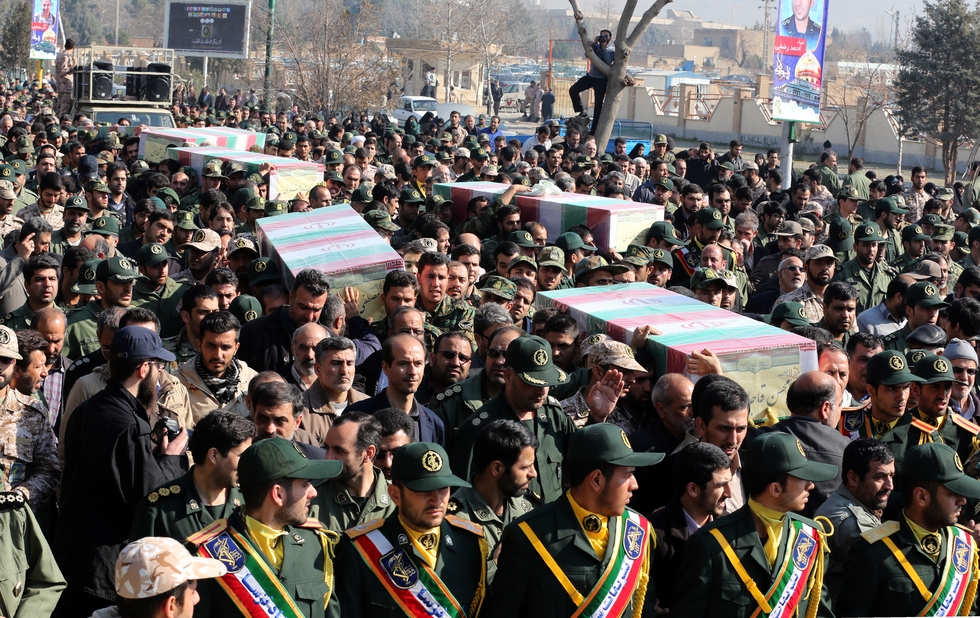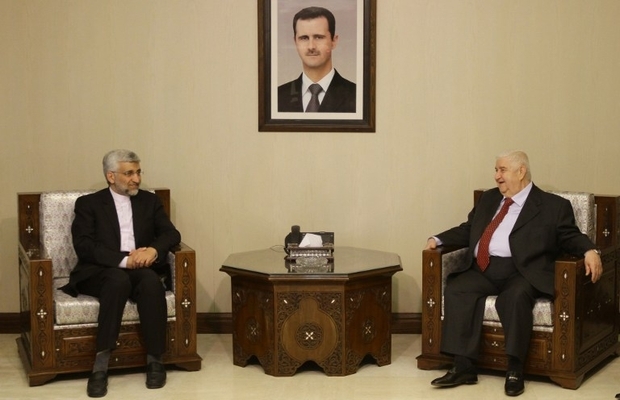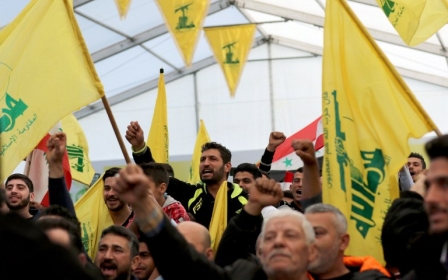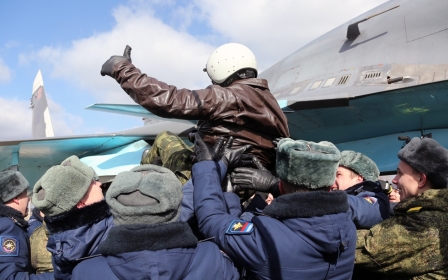ANALYSIS: Iran and Hezbollah feel Syria strain after Russian pull-out

Iran and Hezbollah will feel greater pressure to support the Syrian government after the Russian pull-out at a time when the country and the Lebanese militia may be feeling the pinch, according to analysts.
Russian leader Vladmir Putin surprised world leaders on Monday, announcing that much of Moscow’s forces were being withdrawn after six months of bombing in Syria.
The Russian move has raised questions about the degree of support the Kremlin will continue to offer Syrian President Bashar al-Assad – but there are also questions about whether Iran and Hezbollah can take the added burden in Russia’s absence, say analysts.
“If this withdrawal is really going to happen, it makes Syria dependent again upon Iran in a very significant way, and it also puts a strain on Hezbollah,” Geneive Abdo, a non-resident fellow with the Atlantic Council, told Middle East Eye.
Like Russia, Iran’s economy is heavily based on oil and falling prices have had a major impact on its economy and spending power in Syria.
Hezbollah, too, has been coming under increasing strain as a result of its involvement in Syria.
Earlier this month, Saudi Arabia cancelled a $4bn in aid to the Lebanese army over Hezbollah’s involvement in Syria and, several days later, the GCC listed the militia as a "terrorist group".
Aside from financial burden, some analysts suggest Iran may be tempted to pull support from Syrian President Bashar al-Assad, even while continuing to back the country that has long had geopolitical significance for Tehran.
Ties that bind?
Syria and Iran’s strategic relationship dates back to the Cold War. One key binding tie is Syria’s role as a transit area for the Iranians to send arms and aid through to Hezbollah in Lebanon which Tehran supports to challenge Israel.
Iran has been a vocal supporter of Assad and the Syrian government throughout the civil war, which on Tuesday entered its sixth year.
When the Syrian crisis first erupted in 2011, Iran sent advisers, equipment and financial aid to Damascus in order to stop the government from being unseated by protesters.
The pro-Assad National Defence Force, one of the largest militia networks in Syria, is also thought to have been trained and funded by Iran.
When the Syrian conflict crossed over into Lebanon in 2012, Hezbollah mobilised – sending thousands of fighters across the border to support Assad.
The rise of the Islamic State (IS) militant group and other Sunni armed groups has been of a major concern to Iran as it has added to the threats to Damascus and the Syrian state.
By June 2015, Bloomberg reported that it was probable Iran was spending at least $6bn a year to shore up Assad’s government, although it could be far higher.
On Tuesday, Iran’s parliamentary speaker, Ali Larijani, praised the Syrian government for its continued fight against “terrorists” during a meeting with Syrian Deputy Foreign Minister Faisal al-Mekdad in Tehran.
The meeting was reportedly scheduled in the wake of comments by Syrian Foreign Minister Walid Muallem last week, days ahead of the resumption of peace talks, in which he said ousting Assad was a "red line". Analysts have questioned whether these comments were a spark that led to Russia’s withdrawal.
“The Syrian nation is a resistant nation which has, through perseverance and resistance, managed to leave behind critical and sensitive conditions,” Larijani said.
‘Assad or no Assad’
But will the Syrian-Iran fight against "terrorists" continue with Assad at the helm?
Abdo with the Atlantic Council said she could not foresee Iran withdrawing its support for the Syrian government despite its financial burdens, although support for Assad might be a different case.
“Will Iran withdraw strong support for the regime? I don’t see that happening, but I think they would easily dispense with Assad in order to keep the regime in place,” she said.
Arshin Adib-Moghaddam, SOAS professor and author of On the Arab Revolts and the Iranian Revolution agreed that the support was more about the government than Assad himself.
“Iran and Russia have not supported Assad per se. They have supported the sovereignty of the Syrian state, in particular in the face of terror movements such as IS or the Nusra Front,” he said.
“Both countries are interested in a Syrian state that continues to be their ally, Assad or no Assad.”
Majid Rafziadeh, the president of the US-based think tank International American Council and a member of the Harvard International Review board, said the Russian exit should not significantly affect the Syrian-Iran relationship.
“Syria is pivotal for Iran geopolitically and strategically. Assad does not need to ask for more support from Iran as the fate of Damascus is a matter of national security for Iran,” Raziadeh said.
“As a result, the Islamic Republic will not abandon the Syrian state and it will do whatever it can in order to maintain the major element of the Alawite state in power.”
Syria, he said, may be more dependent on Iran than before “but we should remember that Russia is not cutting its military support completely”.
Growing ties to Russia
But even given Syria’s geopolitical significance for Iran, and Tehran's continued defence of the government in the face of opposition from Turkey and Saudi Arabia, the Islamic Republic also has increasing links to Russia as the provider of its nuclear facilities, and this could become a factor in how it proceeds.
Additionally, Tehran’s rapprochement with the West since the nuclear agreement last summer means it is keen to improve relations further and may be looking for a negotiated solution to the conflict.
“Iran is more likely now than ever to make some sort of compromise on Assad – especially when we consider that there are lots of other factors involved regarding its relationship with Russia,” Sara Bazoobandi, associate fellow at the MENA programme of the Royal Institute of International Affairs, told Middle East Eye.
“If Iran wanted to make a compromise, this moment would be it.”
She added that given the ties between Iran and Russia, who have been allies in Syria in the face of US and European pressure, it was difficult to say whether Vladimir Putin’s withdrawal was as unilateral as it seemed.
“Given the history, I wouldn’t imagine Russia would take such a significant step without any co-ordination with Iran,” she said.
She added that the financial burden on Iran made it hard to say what would happen next, but that Iran would remain essential to Syria.
“I wouldn’t imagine Syria wants to replace Russia with Iran – it has always been essential and will remain so,” Bazoobandi said.
“Both Iran and Russia offered very important support of Syria and now decisions are being made regarding that support. If from Iran’s point of view that support has changed, it will certainly affect Syria’s confidence going in to the Geneva talks.”
New MEE newsletter: Jerusalem Dispatch
Sign up to get the latest insights and analysis on Israel-Palestine, alongside Turkey Unpacked and other MEE newsletters
Middle East Eye delivers independent and unrivalled coverage and analysis of the Middle East, North Africa and beyond. To learn more about republishing this content and the associated fees, please fill out this form. More about MEE can be found here.





